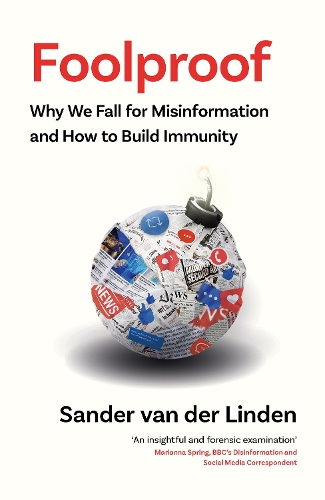
Foolproof: Why We Fall for Misinformation and How to Build Immunity
(Paperback)
Available Formats
Paperback
Published: 8th March 2023
Hardback
Published: 7th June 2023
Paperback
Published: 25th July 2024
Publishing Details
Foolproof: Why We Fall for Misinformation and How to Build Immunity
By (Author) Sander van der Linden
HarperCollins Publishers
Fourth Estate Ltd
8th March 2023
United Kingdom
Classifications
General
Non Fiction
Cognition and cognitive psychology
302.23
Physical Properties
Paperback
336
Width 153mm, Height 234mm, Spine 27mm
490g
Description
A Financial Times Book of the Week
A fascinating, in-depth investigation into the complex landscape of misinformation from someone who has spent his career trying to combat fake news Angela Saini
One of the worlds top experts on fighting misinformation reveals the psychology behind its power and how we can protect ourselves.
From fake news to conspiracy theories, from pandemics to politics, misinformation may be the defining problem of our era. Like a virus, misinformation infects our minds altering our beliefs and replicating at astonishing rates. Once the virus takes hold, our primary strategies of fact-checking and debunking are an insufficient cure.
In Foolproof Sander van der Linden describes how to inoculate yourself and others against the spread of misinformation, discern fact from fiction and push back against methods of mass persuasion.
Everyone is susceptible to fake news. There are polarising narratives in society, conspiracy theories are rife, fake experts dole out misleading advice and accuracy is often lost in favour of sensationalist headlines. So how and why does misinformation spread if were all aware of its existence And, more importantly, what can we do about it
Sander van der Linden takes us through the psychology of conspiratorial thinking and equips us with the eleven antigens needed to help stop the spread of misinformation once and for all.
Reviews
'Authoritative'Financial Times
'Encouraging' The Times
A fascinating case for counteracting the misinformation virus through psychological inoculation Observer
Foolproof proves an overview that is authoritative, comprehensive and chatty. You wont find a better survey of what is now a vast interdisciplinary landscape and that alone is a great service. Tim Harford, FT
An insightful and forensic examination of why our brains entertain disinformation and the remedies that can protect us all from its real-world harm. For everyone who messages me asking how they can speak to someone who has fallen victim to online conspiracies this is the book for you! Marianna Spring
A fascinating, in-depth investigation into the complex landscape of misinformation from someone who has spent his career trying to combat fake news. You will never look at your social media feeds in the same way again Angela Saini, author of Inferior and Superior
a must-read for those of us interested in resisting the spread of disinformation Psychology Today
This brilliant book vividly illuminates the challenges of countering misinformation, showing how human psychology can make us vulnerable to manipulation and conspiracy theories. Van der Lindens analysis would be utterly depressing, were he not to provide a set of powerful evidence-based 'antigens' designed to protect us from false claims. They have never been more needed Professor David Spiegelhalter
Sander van der Linden is one of the worlds leading experts on combating misinformation, and Foolproof is the ultimate handbook for navigating and fighting back against the tsunami that threatens to drown us in bullshit . . . this book will give you the best strategies for building immunity against fake news, propaganda, and conspiracy theories Jay Van Bavel, author of The Power of Us
'Powerful' Kirkus
'Riveting' Waterstones
Author Bio
Sander van der Linden is The Professor of Social Psychology in Society and Director of the Cambridge Social Decision-Making Lab in the Department of Psychology at the University of Cambridge. He is often dubbed Cambridge's 'defence against the dark arts teacher' and his pioneering research on fake news, misinformation, science denial, and the psychology of influence and persuasion is world-renowned and has received many awards. Prior to Cambridge, he was based at Yale University and Princeton University. He earned his PhD from the London School of Economics and Political Science (LSE) and currently resides in Cambridge, UK.
